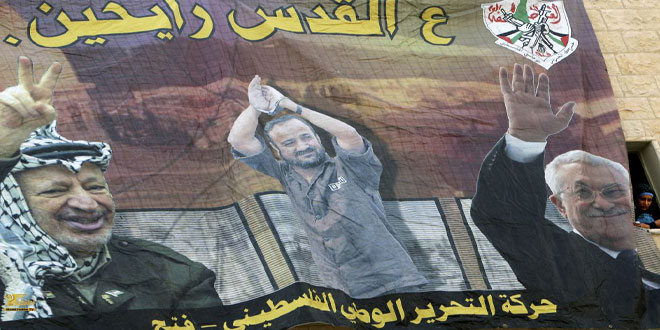THE ARAB WEEKLY

by:Mohamed Kawas
At this juncture, what the world needs to do is to liberate “Palestine’s Mandela.”
Marwan Barghouti is at it again. To Israel’s annoyance, the famous Palestinian prisoner is leading another collective hunger strike. More than 1,500 prisoners in Israeli jails are taking part in the strike, a testimony to the man’s capacity to unite Palestinians regardless of their political affiliation.
A few months ago, Fadwa Barghouti, Marwan’s wife, strongly criticised Fatah for not nominating her husband to its Central Committee. Marwan Barghouti’s recent actions are reminding Fatah members of the party’s central role in the Palestinian struggle.
Hamas, the rival organisation controlling the Gaza Strip, is irked by the uproar surrounding Barghouti’s hunger strike, which began April 17. It does not make Hamas look good, especially considering its claim to represent the real resistance to Israel.
As for Fatah, it has been accused of having become a governing party giving priority to international concerns and demands and, in the process, losing a lot of its lustre and appeal. Palestinian President Mahmoud Abbas has turned Fatah into his choice instrument of authority and power.
Hamas has stayed out of Barghouti’s strike as if to say that it does not recognise the man’s leadership. It continues to ignore any Palestinian action outside its control and is further bothered by hearing Barghouti’s name frequently mentioned as the likely next president of the Palestinian Authority.
The timing of the hunger strike is significant. Abbas was scheduled to meet with US President Donald Trump on May 3.
The hunger strike came at a crucial time when the new US administration is establishing its Middle East policy. American officials are travelling all over the Middle East to fix Washington’s alliances in the region. Of course, Israel will be part of those alliances and Washington wants Israel’s role to be clear and transparent.
It seems Trump has revived the Palestinian question after it had been discarded by his predecessor. During President Barack Obama’s time in office, the situation in the Palestinian territories was bogged in the same rotten quagmire. Negotiations faltered and Israeli settlements flourished.
The new US president is clearly biased towards Israel. He has promised to move the US embassy to Jerusalem. He is hoping for a settlement that is not necessarily advantageous to the Palestinians as much as it is a manoeuvre to have Israel openly recognised as an ally to the Arabs under US auspices.
There were signs of this strategy during the Dead Sea Arab summit. By renewing their call for the Arab Peace Initiative and offering a road map to that end, Arab leaders seem to have implicitly accepted US strategy in the Middle East.
By inviting the Palestinian president to visit, Washington seems to have started implementing the plan. The final outcome, however, is going to necessitate painful sacrifices from both Israel and the Palestinians.
In their reports about the hunger strike, Western media have conspicuously mentioned Barghouti’s name as a likely replacement for Abbas. This is not surprising since Barghouti enjoys widespread popularity among Palestinians.
If that scenario becomes a reality, Barghouti’s presidency might usher a great historic settlement in the Palestinian territories.
Barghouti is very skilled at reading international trends. He is a media favourite and has said over and over again that he seeks peace and that fighting Israel does not preclude negotiating with it. He has continued to repeat the same message even from his jail cell or from courtrooms during his trials.
He has purposely stuck to the spirit of the Oslo Accords. Barghouti has led the recent hunger strike to demand better conditions for all Palestinian prisoners as if to say that the place for political demands is outside prison walls.
At this juncture, what the world needs to do is to liberate “Palestine’s Mandela.” For Israeli Prime Minister Binyamin Netanyahu’s government, this is out of the question.
It is, however, rumoured in Western media that Barghouti’s liberation is being advocated in international corridors as necessary since he can play a crucial role in convincing his fellow Palestinians to accept more painful concessions to realise the great historic accord. Similar sentiments were expressed about Yasser Arafat before the Oslo accords.
The world might be in need of another Arafat but what is really needed is a change in the mindset of Israeli decision-makers. The same mindset that was considered to have erased Arafat’s legacy is still in power and will definitely not tolerate another Arafat.
 khalijefars News, Blogs, Art and Community
khalijefars News, Blogs, Art and Community








